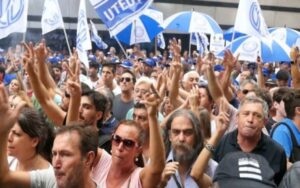
Thousands protest against Milei’s economic course
Argentina’s new President Milei is serious about his “shock therapy” for the economy: the housing and labor markets are to be deregulated. State-owned enterprises will be privatized. Thousands took to the streets to protest against his austerity plans.
Argentina’s new government under ultra-liberal President Javier Milei has begun the transformation of the previously tightly regulated economy of the South American country. “We are initiating the economic deregulation that Argentina so urgently needs,” Milei said in a televised address on Wednesday, announcing a decree with a total of 30 measures.
Fewer rules, more privatization
This is intended to abolish or reform 300 existing regulations, including numerous laws regulating the labor and real estate markets. “The goal is to pave the way for rebuilding the country, returning freedom and autonomy to the people, and starting to dismantle the huge number of regulations that have hindered and prevented economic growth in our country,” Milei said.
The real estate market must function “without problems” again, so that the search for an apartment does not become an “odyssey,” Milei said. Privatization of state-owned companies such as the oil company YPF and the airline Aerolíneas Argentinas should also be made possible. A reform of labor law should make it easier to create “real jobs.” Sectors such as health, tourism, internet, and trade should also be deregulated.
Protests remain largely peaceful
Thousands of people took to the streets to protest against the new government’s free-market course. In Buenos Aires, participants gathered for a march and headed to the historic Plaza de Mayo in the heart of the capital. Protesters were prevented by police from occupying the entire square.
The protest remained largely peaceful after the government threatened tough consequences in the event of roadblocks. Although the protests were allowed, those who blocked the streets were threatened with the withdrawal of social assistance. Demonstrators were also forbidden from carrying sticks, wearing masks, and bringing children to the demonstrations.
Conservative Minister of Security Patricia Bullrich had announced a vehement crackdown on possible roadblocks. Trade unions accused the government of criminalizing the right to strike and protest. They also criticized the significant price increases following the devaluation of the Argentine peso and Milei’s initial austerity measures.
High debt, widespread poverty
Milei, who was elected in November, had promised the heavily indebted country a “shock therapy” and announced a tough first year before the measures would begin to take effect.
The 53-year-old political novice took office amid a severe economic crisis: inflation has risen to over 160 percent, and around 40 percent of the population lives below the poverty line.
Argentina suffers from an oversized public sector, low productivity in the industry, and a large shadow economy that deprives the state of significant tax revenues. The national currency, the peso, continues to lose value against the US dollar, and the debt burden is constantly growing. In addition, there is a massive budget deficit, a trade deficit of $43 billion, and debts of $45 billion to the International Monetary Fund.